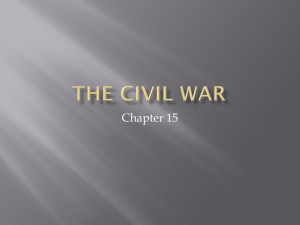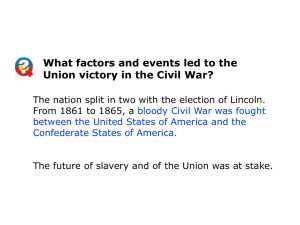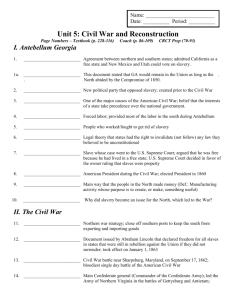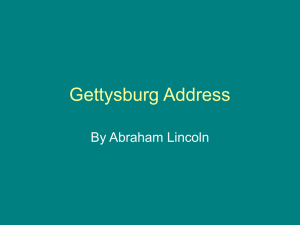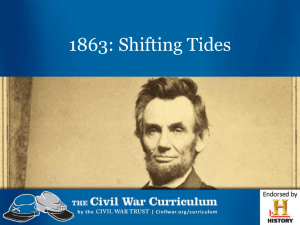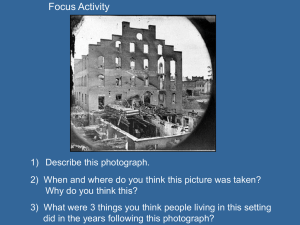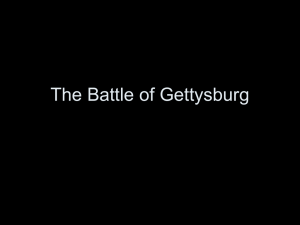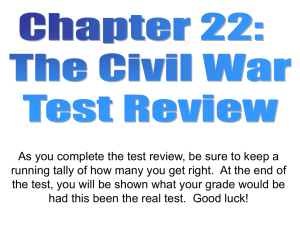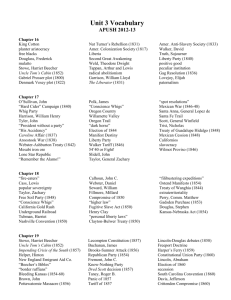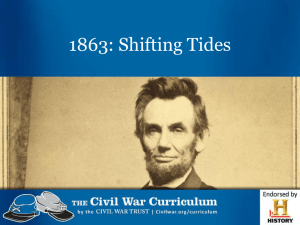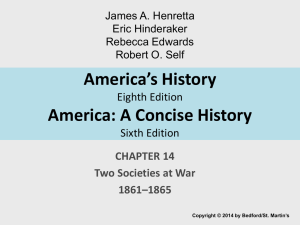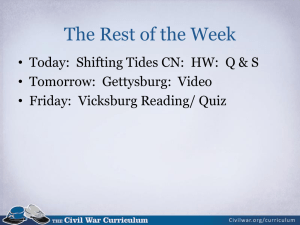21 The Furnace of the Civil War
advertisement
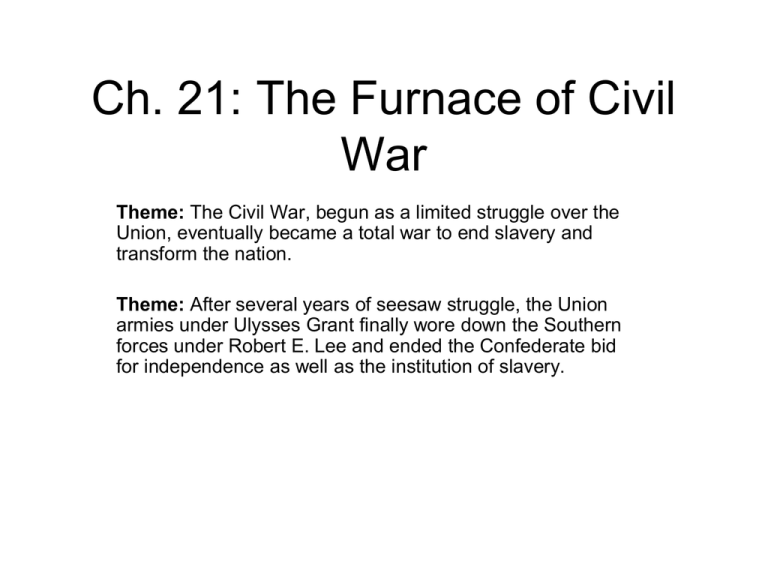
Ch. 21: The Furnace of Civil War Theme: The Civil War, begun as a limited struggle over the Union, eventually became a total war to end slavery and transform the nation. Theme: After several years of seesaw struggle, the Union armies under Ulysses Grant finally wore down the Southern forces under Robert E. Lee and ended the Confederate bid for independence as well as the institution of slavery. I. Stalemate in East A. Union Strategy, “90-day War” 1. 2. B. Military panic at “Bull Run” Pensive “Peninsula Campaign” Union Strategy is Total War! 1. “Anaconda Plan” a. Merrimack (CSS Virginia) v. Monitor C. Confederate Strategy, “Invade North” 1. Antietam, 1862 a. b. Emancipation Proclamation Democrats-too far, Abolishionists-not enough, Moderates and Europeans-OK I. Stalemate in East (cont.) 2. Fredericksburg a. “Burnside’s Slaughter Pen” 3. Chancellorsville a. “Fightin” Joe Hooker loses to force ½ size 4. Gettysburg a. Lee looking to negotiate peace and foreign intervention. b. “High tide” of Confederacy c. Meade failure to pursue d. Gettysburg Address July 1st, 1863 •Union Calvary (Buford) •Maj Gen. Reynolds •Chambersburg Pike •Seminary •Cemetery Hill July 2, 1863 •“Fishhook” formation (int) •Seminary Ridge (ext.) •Longstreet’s Attack on Union left flank •Sickles and Peach O. •“Devil’s Den” •Little Round Top and Maine 20th •Ewell right flank •Culp’s Hill •137th New York •J.E.B. Stuart Arrival July 3, 1863 •Union Reinforcements •Culp’s Hill •Longstreet’s Attack on The center •Confederate Artillery •Pickett’s Charge •“The Angle” and “Copse of Trees” II. Success in West A. Union: Divide and Conquer 1. 2. New Orleans, 1862 Ohio River Valley a. b. c. 3. B. Fort Henry and Donelson, 1862 Shiloh, 1862 Vicksburg, 1863 Sherman’s March to the Sea (“War is Hell!”) Politics of War 1. 2. Radical Republicans and C.C. C of War Northern Democrats a. b. 3. “War” Democrats Peace Democrats including the “Copperheads” Election of 1864-most crushing loss for the Confederacy III. End of the War A. Union Forces Push to Richmond 1. Simultaneously attack a. b. c. d. B. Assassination of Lincoln, 1865 1. 2. C. Wilderness Cold Harbor Petersburg and Richmond Appomattox Courthouse Plot to kill the president by John Wilkes Booth Significant impact on reconstruction Impact of the war Map Questions (use the maps and charts in chapter 21 to answer the questions) 1. Which two states of the Southeast saw little of the major fighting of the Civil War? 2. In which four states were the slaves all freed by state action—without and federal involvement? 3. Which two states kept slavery until it was finally abolished by the Thirteenth Amendment to the Constitution? 4. On what three rivers were the major Confederate strategic points that Grant successfully assaulted in 1862-1863? 5. What major secessionist South Carolina city was not in the direct path of Sherman’s army in 1864-1865? 6. What major battle of Grant’s final campaign was fought very close to the Confederate capital city? Map Answers 1. 2. 3. 4. 5. 6. Alabama and Florida Missouri, Tennessee, West Virginia, Maryland Kentucky, Deleware Tennessee, Cumberland, Mississippi Charleston Cold Harbor
